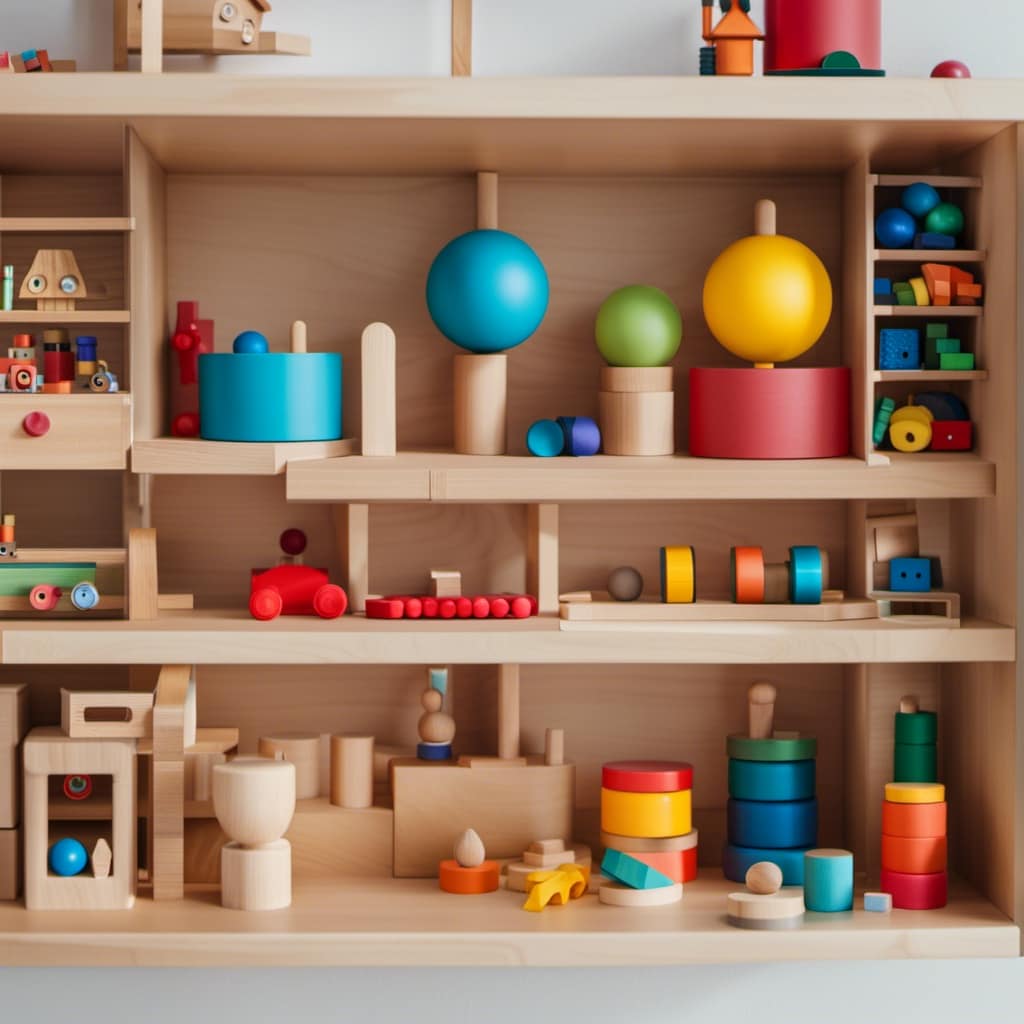Looking for the best Montessori toys for your kids? Look no further! We’ve put together a carefully curated list of 14 tips to help you select the perfect toys for your children.
From age-appropriate options to toys that promote problem-solving and social interaction, we’ve got all the insider knowledge you need.
Get ready to embark on a journey of learning, growth, and joy as we help you find the perfect toys that will serve your children’s development.
Key Takeaways
- Consider the child’s developmental stage when selecting Montessori toys.
- Prioritize safety by choosing non-toxic materials and avoiding choking hazards.
- Encourage open-ended play and imagination to develop cognitive and social skills.
- Provide hands-on sensory experiences and opportunities for learning through active exploration.
Age-Appropriate Toys
When selecting Montessori toys, we should consider age-appropriate options that cater to a child’s developmental stage. Age appropriate development is crucial in ensuring that children engage with toys that challenge and stimulate their growing minds.
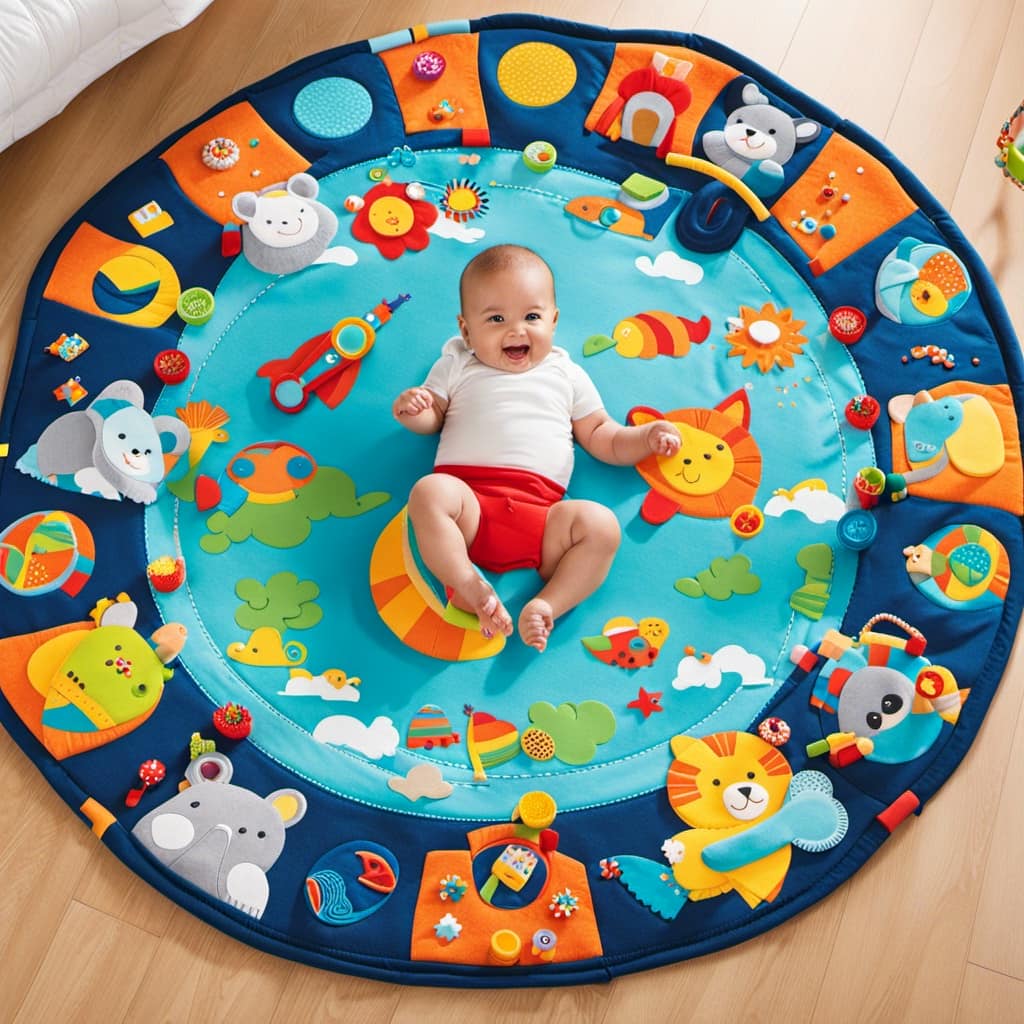
It’s important to take into account the different stages of development, such as fine motor skills, cognitive abilities, and social interactions. Safety measures should also be prioritized when choosing toys, ensuring that they’re made of non-toxic materials and don’t pose any choking hazards.
By selecting toys that are suitable for a child’s age, we can provide them with opportunities for growth and learning.
As we transition into discussing open-ended play options, it’s important to note that these toys can further enhance a child’s creativity and imagination.
Open-Ended Play Options
As we transition from considering age-appropriate options, let’s explore the benefits of incorporating open-ended play options into a child’s toy selection.
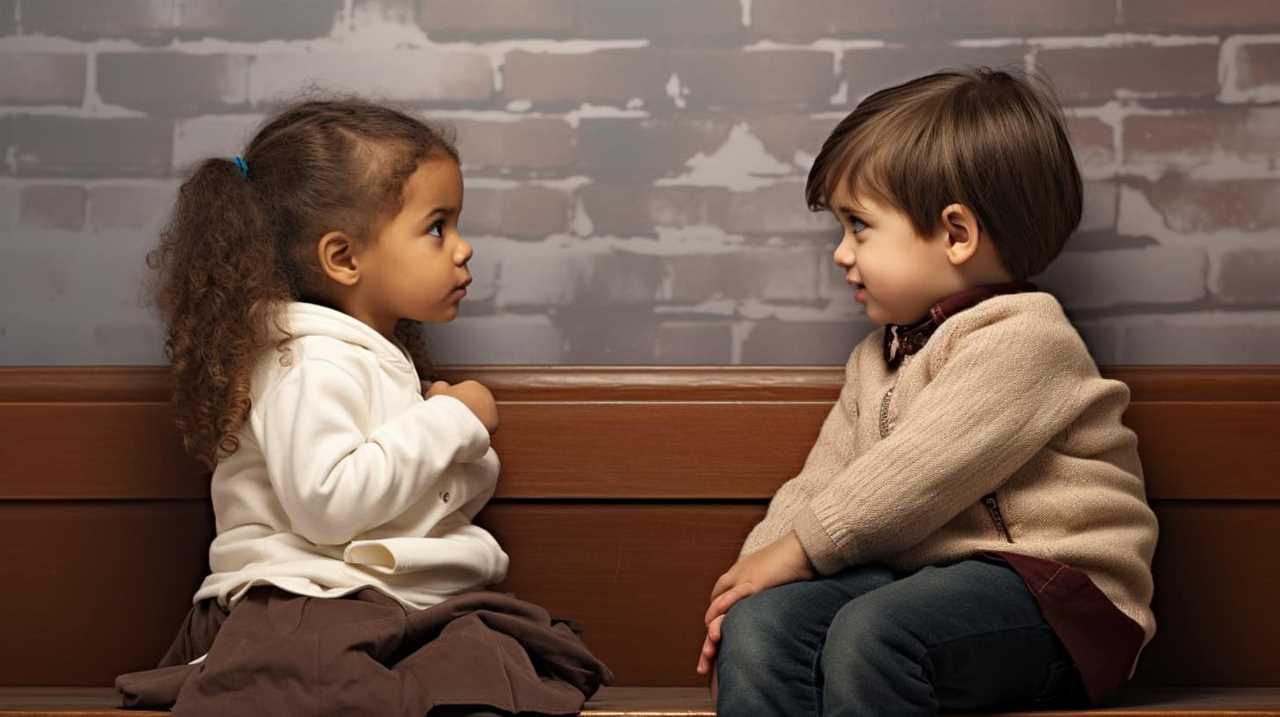
Open-ended play refers to toys and activities that have no specific rules or predetermined outcomes, allowing children to use their imagination and creativity to explore and discover.
One of the main benefits of open-ended play is that it inspires imaginative play. When children are given the freedom to create their own scenarios and narratives, they develop important cognitive and social skills. They learn to problem-solve, think critically, and communicate effectively with others.
Open-ended play also encourages independent thinking and decision-making, as children have the freedom to explore and experiment with different materials and possibilities.
Focus on Sensory Experiences
Let’s prioritize toys that provide sensory experiences when selecting the perfect Montessori toys. Sensory exploration plays a vital role in a child’s development, as it helps them understand and make sense of the world around them. Here are two key reasons why focusing on sensory experiences is crucial when choosing Montessori toys:
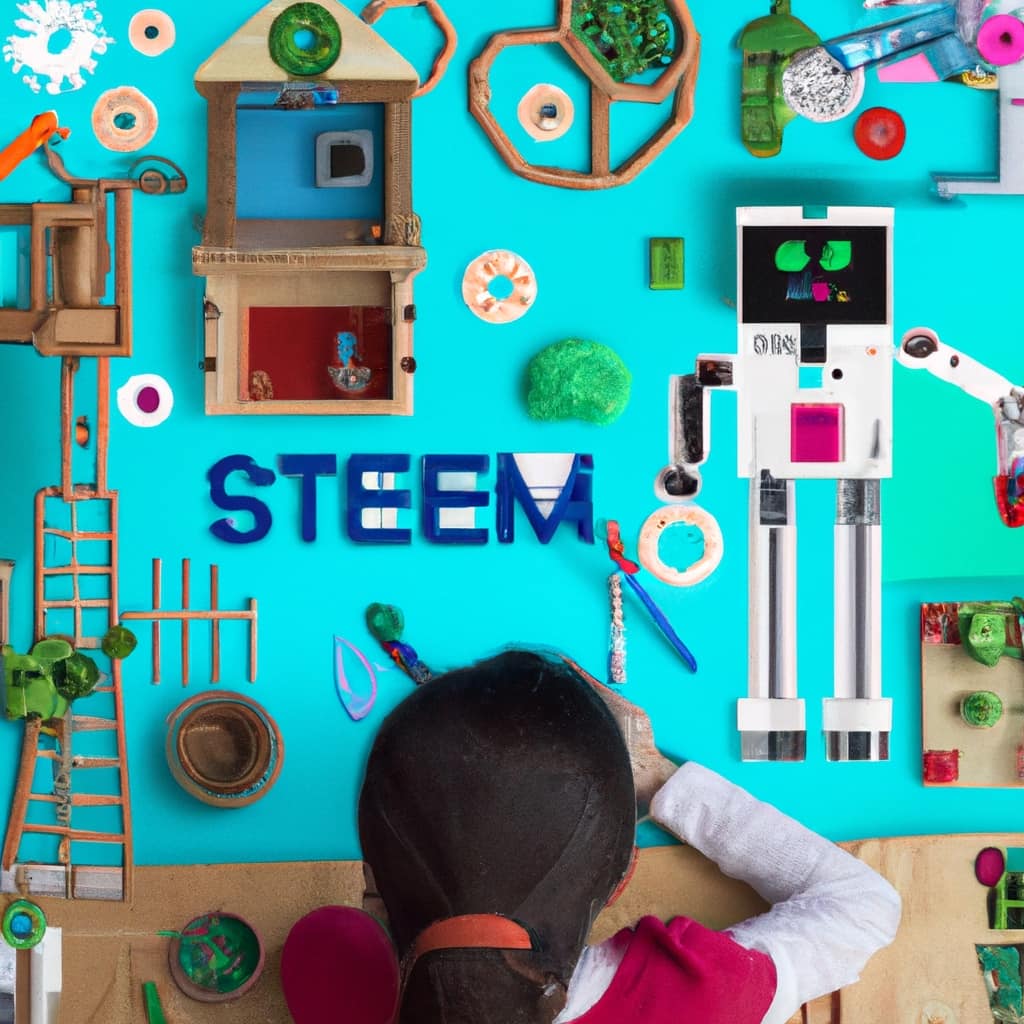
-
Enhanced sensory development: Montessori toys that engage different senses, such as touch, sight, and sound, promote the development of sensory skills. They allow children to explore various textures, colors, and sounds, stimulating their senses and fostering cognitive growth.
-
Holistic learning: Sensory experiences not only aid in sensory development but also support overall learning and understanding. By engaging multiple senses, these toys encourage children to make connections, develop problem-solving skills, and improve their memory and concentration abilities.
Promote Hands-On Learning
To continue our exploration of Montessori toys, let’s now delve into how they promote hands-on learning. Montessori toys are specifically designed to encourage children’s active engagement and participation in the learning process. They provide hands-on exploration opportunities that foster a deeper understanding of concepts and develop essential skills.
One of the key aspects of hands-on learning is tactile learning, which involves using the sense of touch to explore and manipulate objects. Montessori toys often incorporate different textures, shapes, and materials to stimulate the child’s sense of touch and enhance their learning experience.

Here is a table highlighting some popular Montessori toys that promote hands-on exploration and tactile learning:
| Toy | Description |
|---|---|
| Sensorial Puzzle | Wooden puzzle with various shapes and textures to enhance sensory play |
| Building Blocks | Solid wooden blocks that allow children to create and construct |
| Sensory Bin | Bin filled with materials like sand, water, or rice for sensory play |
| Shape Sorter | Toy with different shapes for children to match and sort |
| Bead Maze | Colorful bead maze that aids in hand-eye coordination and fine motor skills |
These toys provide children with the opportunity to actively engage their senses and manipulate objects, fostering a love for learning and promoting cognitive, physical, and emotional development.
Consider Material Quality and Durability
Now, let’s examine the importance of considering the quality and durability of the materials used in Montessori toys. When selecting toys for your child, it’s crucial to prioritize material safety and choose long-lasting options.
Here are some reasons why:

-
Material Safety:
-
Montessori toys should be made from non-toxic materials, ensuring that they’re safe for children to handle and explore without any health risks.
-
Opting for toys made from natural materials, such as wood or organic cotton, can further enhance safety and reduce the exposure to harmful chemicals.
-
Long Lasting Toys:
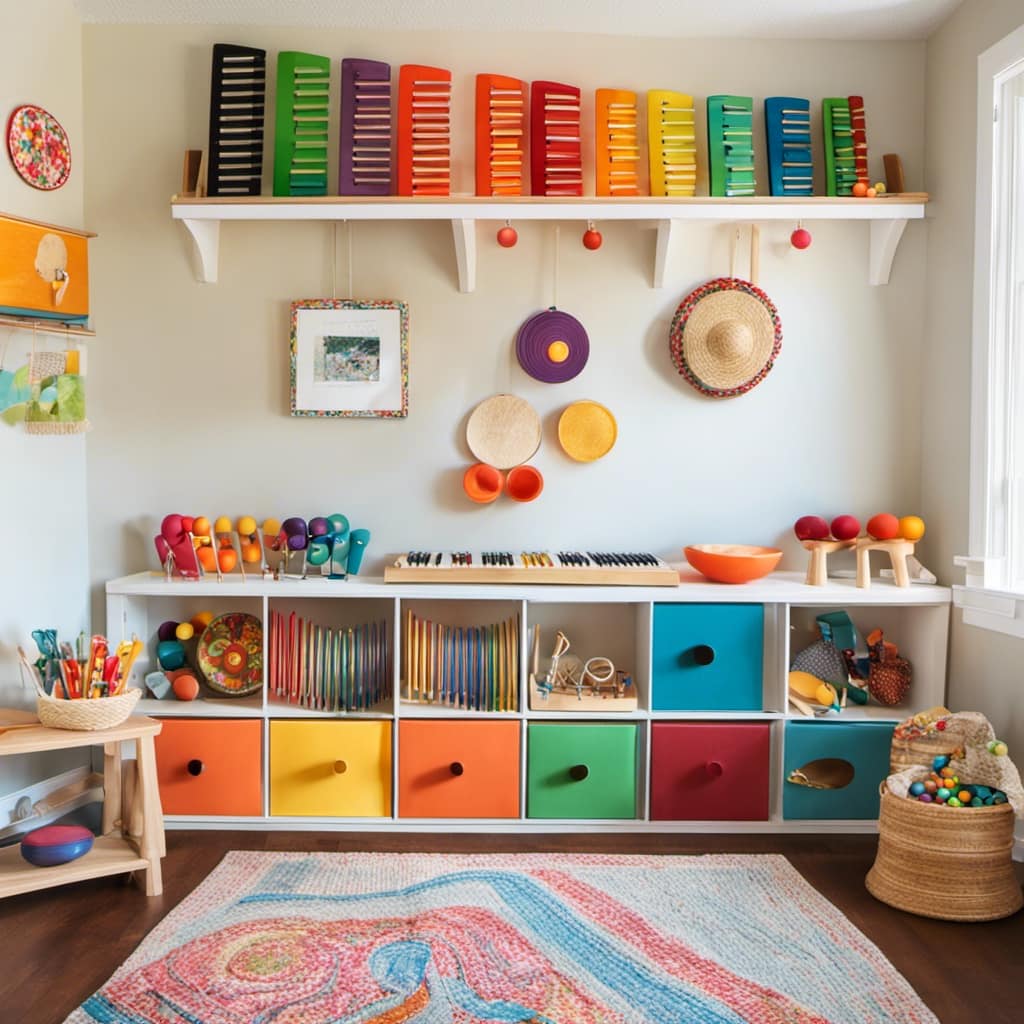
-
Investing in durable toys ensures that they can withstand the test of time and multiple children, making them a worthwhile and sustainable investment.
-
Sturdy toys also promote independence and enable children to explore and experiment freely without the fear of easily breaking or damaging them.
Considering the quality and durability of materials used in Montessori toys not only ensures the safety of your child but also encourages independent exploration.
Encourage Independent Exploration
Considering the importance of material safety and durability, we can encourage independent exploration through carefully selecting Montessori toys. Independent play is a crucial aspect of a child’s development, as it promotes self-discovery and fosters a sense of autonomy.

When choosing toys, opt for those that allow children to manipulate and explore on their own. Montessori toys are designed to stimulate curiosity and encourage hands-on learning. Look for toys that offer open-ended play opportunities, such as building blocks or puzzles, as they allow children to engage in imaginative play and problem-solving.
By providing children with toys that promote independent exploration, we empower them to discover their own interests and learn at their own pace.
Transitioning into the next section about fostering creativity and imagination, let’s explore the role of Montessori toys in nurturing these important skills.
Foster Creativity and Imagination
When it comes to selecting Montessori toys, fostering creativity and imagination should be at the forefront of our minds.
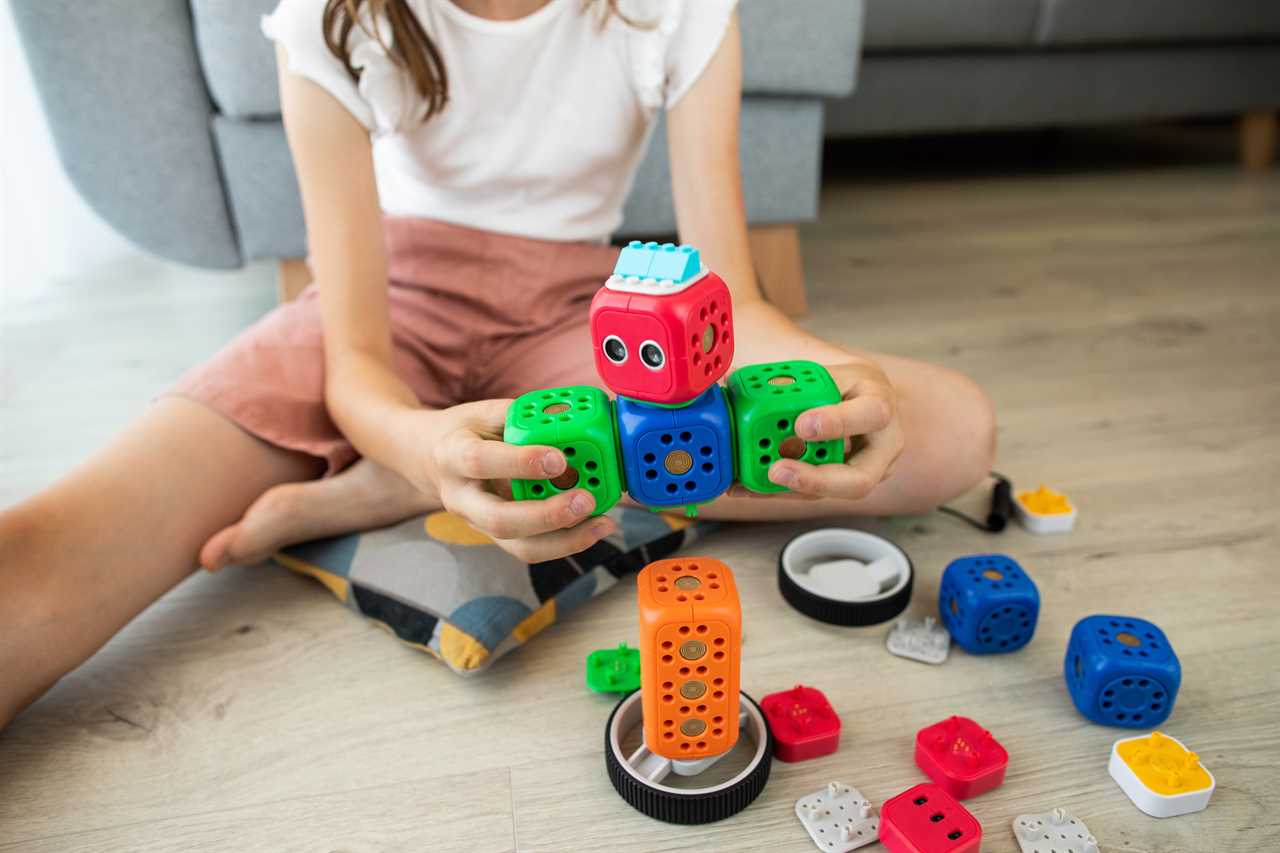
Open-ended play benefits children in numerous ways, allowing them to explore their own ideas and express themselves freely.
Open-Ended Play Benefits
One of the key benefits of open-ended play is that it fosters creativity and imagination in children. When children engage in open-ended play, they’re given the freedom to explore and create without restrictions. This type of play allows them to use their imagination and come up with new ideas and solutions. It also helps them develop problem-solving skills as they’ve to think critically and think outside the box.
The importance of socializing is also evident in open-ended play. Children have the opportunity to interact with their peers, share ideas, and collaborate on projects. This not only enhances their social skills but also promotes teamwork and cooperation. Open-ended play encourages children to communicate and express their thoughts and feelings, which helps build their confidence and self-esteem. It allows them to learn from each other and develop empathy and understanding towards others.
Inspiring Imaginative Play
As we continue our exploration of open-ended play benefits, let’s now delve into the subtopic of inspiring imaginative play, which fosters creativity and imagination in children.
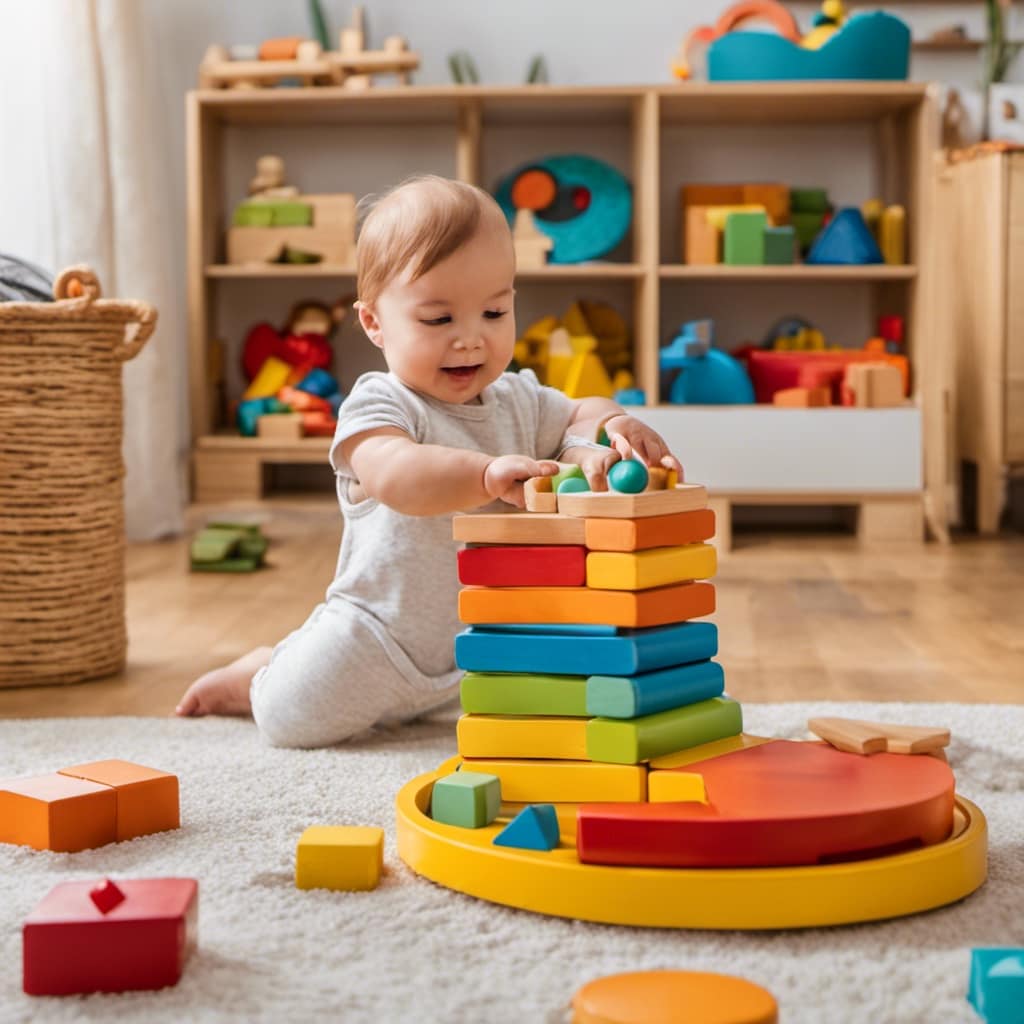
Inspiring creativity through imaginative play is essential for a child’s cognitive, emotional, and social development. When children engage in imaginative play, they’ve the opportunity to explore different roles, scenarios, and problem-solving strategies. This type of play allows them to express their thoughts and feelings, build their communication skills, and develop their ability to think outside the box.
Imaginative play benefits children by stimulating their imagination, encouraging them to think creatively, and enhancing their problem-solving skills. By providing children with toys that inspire imaginative play, such as dollhouses, building blocks, and dress-up costumes, we can nurture their creativity and imagination.
Now, let’s move on to the next section, where we’ll discuss nurturing creative thinking.
Nurturing Creative Thinking
To continue fostering creativity and imagination, let’s now explore how we can nurture creative thinking when selecting Montessori toys.
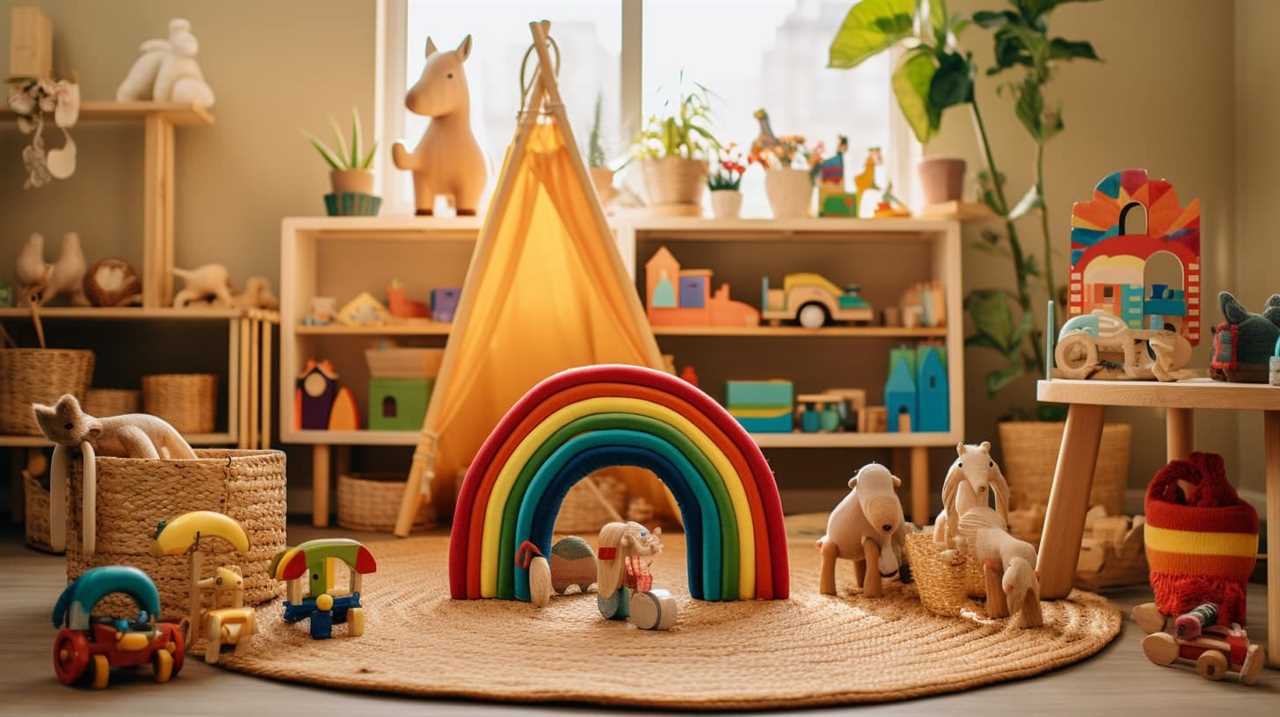
When it comes to nurturing creative thinking in children, it’s important to choose toys that promote independent exploration and encourage imaginative play. Here are some tips to help you select the perfect Montessori toys:
- Offer open-ended toys that allow for multiple uses and interpretations, such as building blocks, art supplies, and pretend play sets.
- Look for toys that stimulate problem-solving skills, such as puzzles, construction sets, and building toys.
- Provide materials that encourage sensory exploration, such as playdough, sand, and water play.
- Choose toys that inspire storytelling and role-play, such as dolls, puppets, and dress-up costumes.
- Opt for toys that encourage creativity through music and movement, such as musical instruments and dance props.
Support Fine Motor Skill Development
We recommend choosing Montessori toys that actively engage and promote the development of fine motor skills in children.
Fine motor skills refer to the ability to use small muscles in the hands and fingers, allowing children to perform tasks such as grasping, holding, and manipulating objects. These skills are crucial for various everyday activities, such as tying shoelaces, writing, and buttoning clothes.
During early childhood, children go through important fine motor skill milestones, such as learning to hold a crayon, stack blocks, and use scissors. By providing Montessori toys that require precise hand movements, such as puzzles, threading beads, or using tweezers, children can strengthen their hand-eye coordination, dexterity, and finger strength.
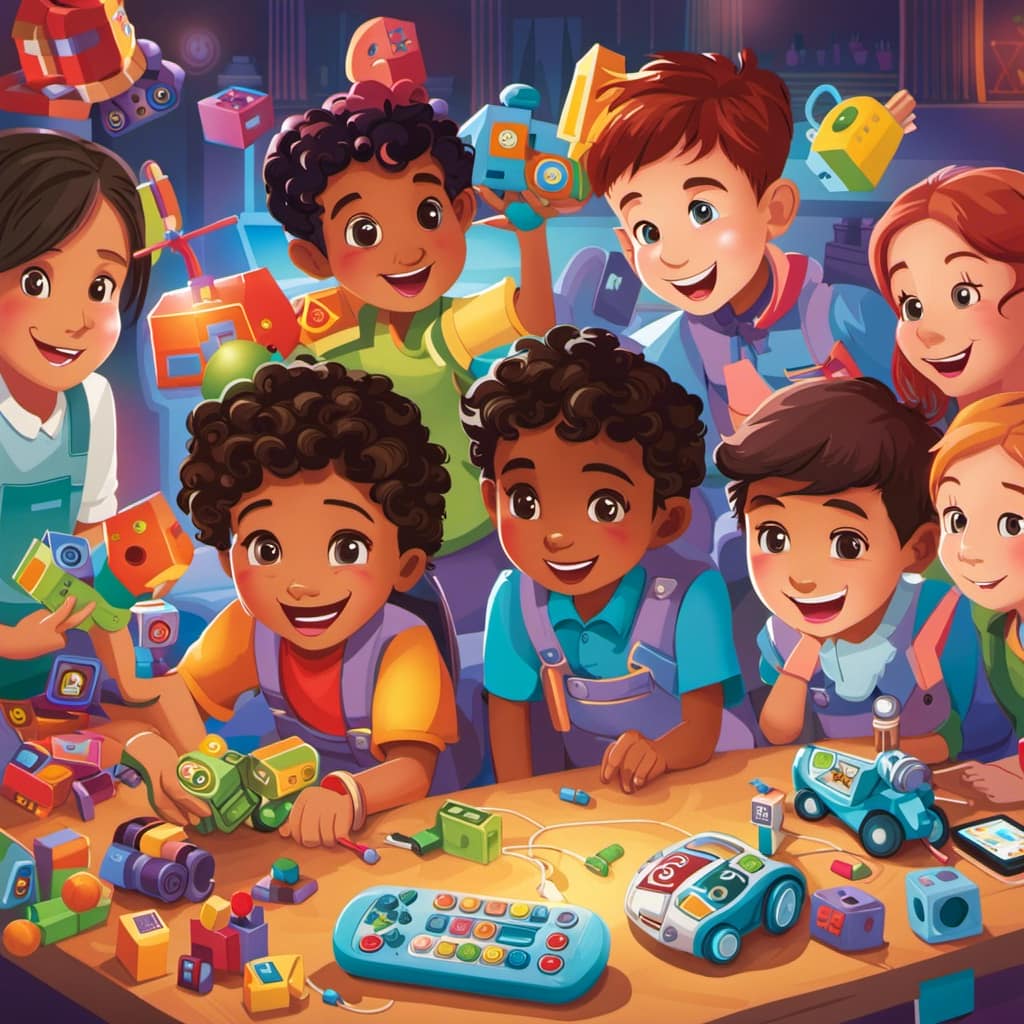
Developing fine motor skills not only supports independence but also lays the foundation for future academic success.
Incorporate Practical Life Activities
When selecting Montessori toys, it’s important to incorporate practical life activities that promote real-world skill development.
These toys allow children to engage in tasks that mimic everyday activities, such as pouring, sweeping, and buttoning, which helps them gain independence and responsibility.
Real-World Skill Development
One essential aspect of real-world skill development in Montessori toys is incorporating practical life activities. These activities provide children with the opportunity to engage in hands-on experiences that mirror real-life situations, allowing them to develop a wide range of skills that are essential for daily living.
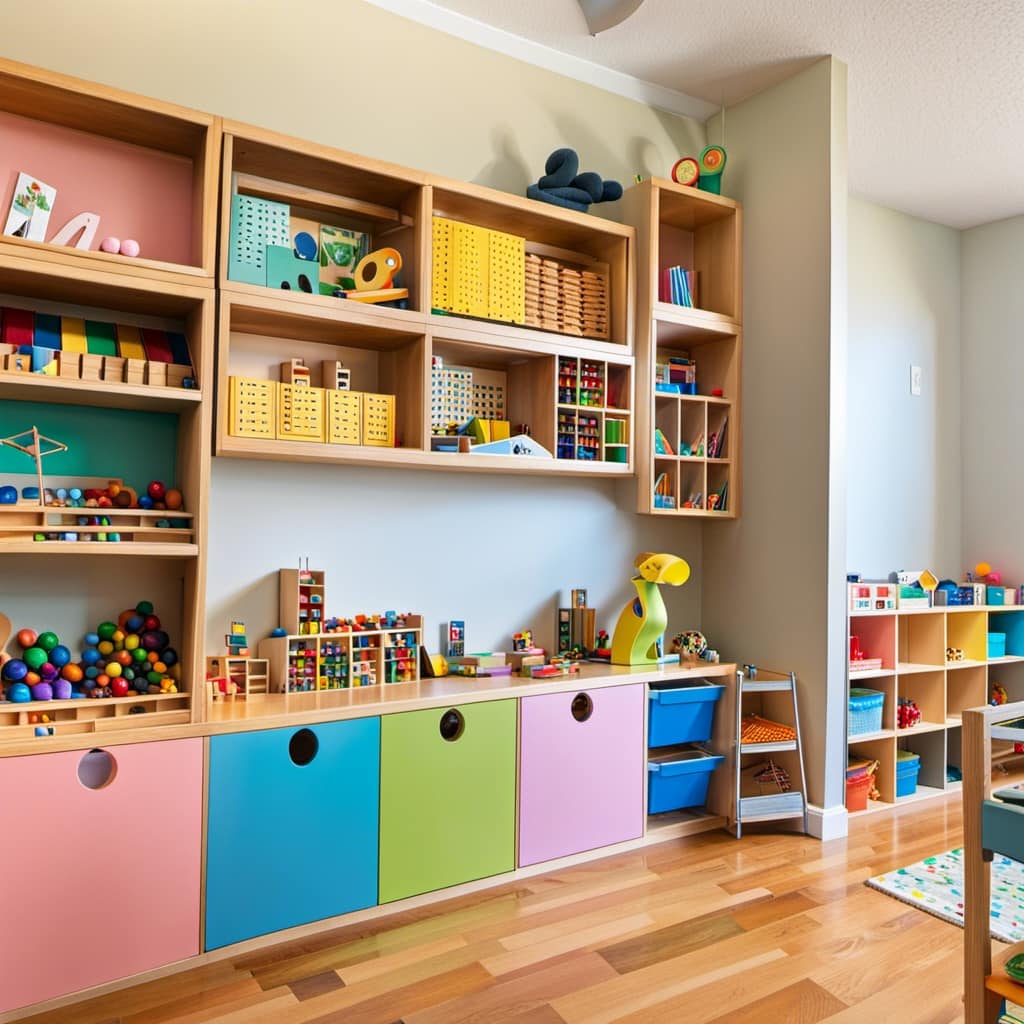
Here are two sub-lists that highlight the importance of practical life activities in Montessori toys:
-
Real-world skill development:
-
Encourages children to learn and practice everyday tasks such as pouring, sweeping, and buttoning, fostering independence and self-confidence.
-
Develops fine motor skills, hand-eye coordination, and concentration through activities like cutting fruits, threading beads, and using tongs.

-
Open-ended play options:
-
Allows children to use their imagination and creativity, as they’ve the freedom to explore different ways of playing with the toys.
-
Promotes problem-solving and critical thinking skills, as children are encouraged to find their own solutions and make decisions independently.
Promotes Independence and Responsibility
Promoting independence and responsibility is achieved through the incorporation of practical life activities in Montessori toys.

These toys are designed to provide children with real-life experiences and teach them important skills that they can apply in their daily lives.
By engaging in activities such as pouring, sorting, and cleaning, children develop their fine motor skills, hand-eye coordination, and concentration.
These activities also foster responsibility by teaching children how to take care of their environment and belongings.
For example, a toy kitchen set can encourage children to prepare their own meals and clean up afterwards, promoting independence and a sense of responsibility.

Montessori toys that incorporate practical life activities not only provide hours of fun and entertainment but also empower children to become independent, responsible individuals.
Enhances Fine Motor Skills
To further enhance fine motor skills, Montessori toys incorporate practical life activities that engage children in hands-on experiences and encourage them to develop important skills they can apply in their daily lives. These toys are designed to promote hand-eye coordination and provide numerous benefits for fine motor skill development.
Here are some key reasons why incorporating practical life activities in Montessori toys can be beneficial:
-
Development of hand-eye coordination:
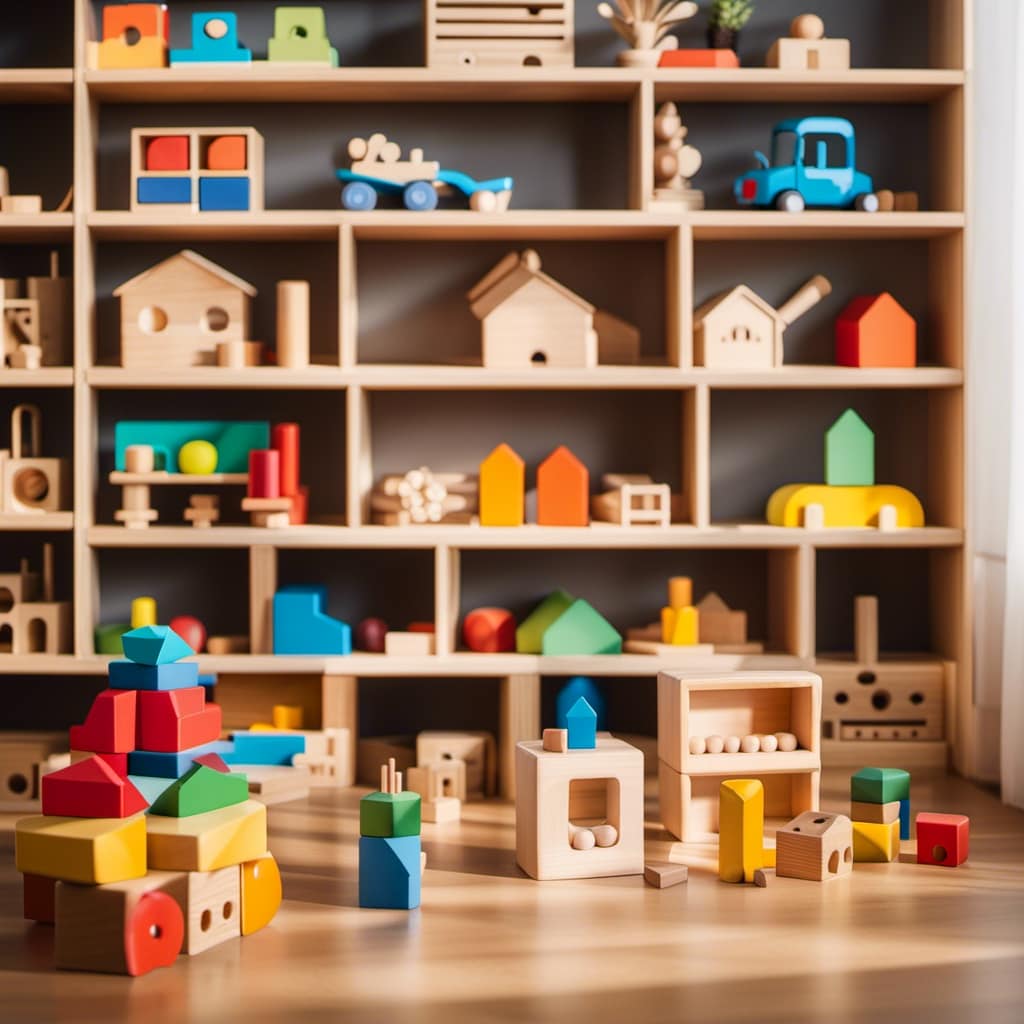
-
Montessori toys that involve activities like sorting, stacking, and threading help children improve their hand-eye coordination.
-
These activities require children to use their hands and eyes together, enhancing their ability to coordinate their movements accurately.
-
Benefits of fine motor skill development:
-
Fine motor skills are essential for tasks like writing, tying shoelaces, and buttoning clothes.

-
Montessori toys that focus on practical life activities help children develop the dexterity and control needed for these tasks.
Emphasize Natural and Eco-Friendly Materials
Our emphasis on natural and eco-friendly materials ensures that the toys we select for our Montessori classroom align with our values. We believe that using natural and sustainable materials not only benefits the environment but also promotes a sense of connection to the natural world in children.
When choosing toys, we prioritize options made from materials such as wood, organic cotton, and natural dyes. These materials aren’t only safe for children but also durable, ensuring the toys will last for years to come. Additionally, we seek out eco-friendly toy options that are free from harmful chemicals and toxins.
Choose Toys That Promote Concentration
When selecting Montessori toys, we prioritize options that foster concentration in children. We believe that toys play a crucial role in aiding mindfulness and enhancing focus and attention. Here are two types of toys that can promote concentration:
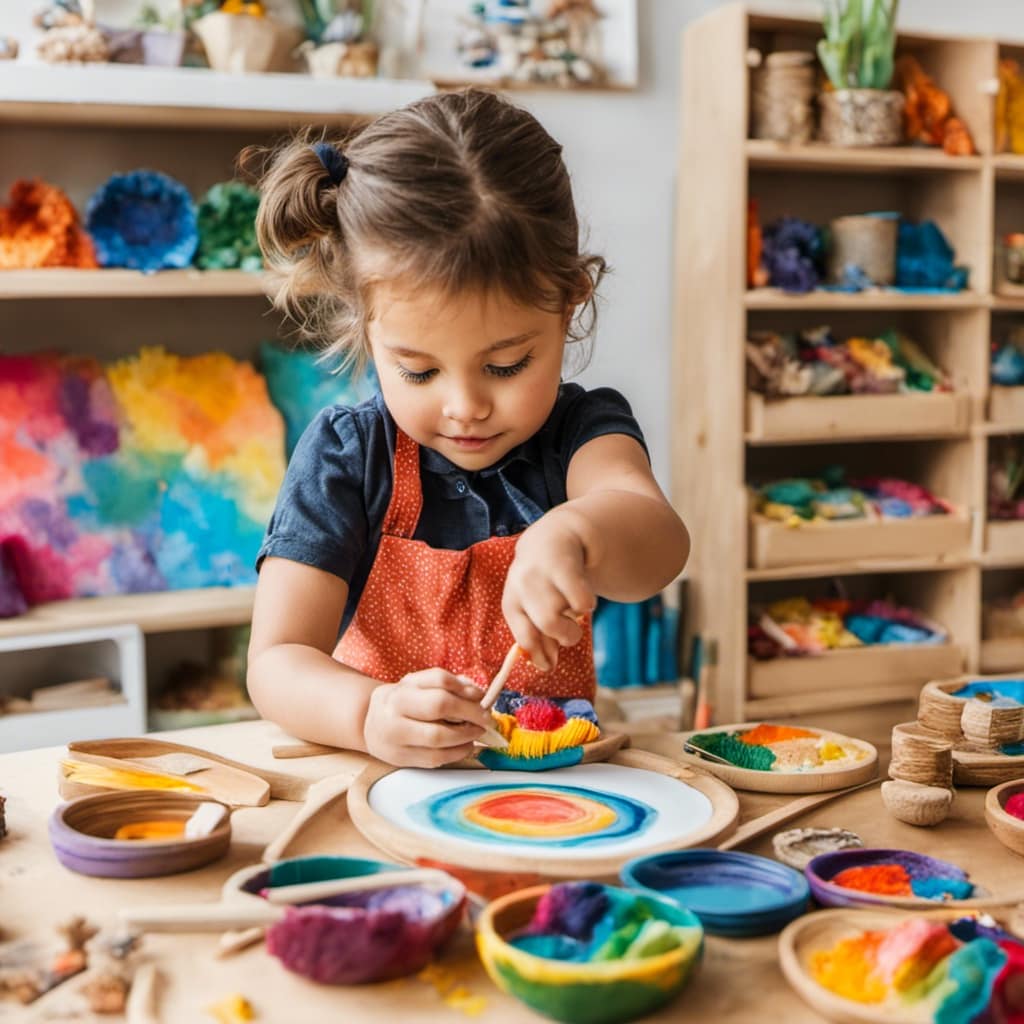
-
Sensorial toys: These toys engage multiple senses and help children focus their attention. Examples include puzzles, stacking blocks, and sensory bins filled with different textures.
-
Open-ended toys: These toys have no predetermined outcome, allowing children to explore and concentrate on their own ideas and creations. Examples include building blocks, art materials, and dress-up clothes.
Consider Multi-Purpose Toys
We prioritize toys that serve multiple purposes to maximize their value and versatility in supporting children’s development and learning. Multi-purpose toys not only provide entertainment but also promote cognitive, physical, and social skills. These toys encourage long-term engagement, as children discover new ways to play and learn with them. Here is a table showcasing some examples of multi-purpose toys and the various skills they can help develop:
| Toy | Purpose | Skills Developed |
|---|---|---|
| Building Blocks | Construction | Fine motor skills, problem-solving, creativity |
| Puzzle Sets | Problem-solving | Logical thinking, hand-eye coordination, patience |
| Play Kitchen | Pretend play | Social skills, imagination, fine motor skills |
| Musical Instruments | Sensory exploration | Rhythm, coordination, auditory discrimination |
Prioritize Toys That Promote Problem-Solving
To ensure the optimal development of children, it’s essential to prioritize toys that actively promote problem-solving skills. By engaging children in activities that require critical thinking and problem solving, we can help them develop these important skills from an early age.

Here are some reasons why it’s important to prioritize toys that promote problem-solving:
-
Promote critical thinking: Toys that require children to think critically and find solutions to challenges help them develop their cognitive abilities and problem-solving skills.
-
Enhance problem-solving skills: Toys that present problems or puzzles for children to solve encourage them to think creatively and come up with innovative solutions.
By prioritizing toys that promote problem-solving, we can nurture children’s ability to think critically and creatively. This lays a strong foundation for their future academic and personal success.
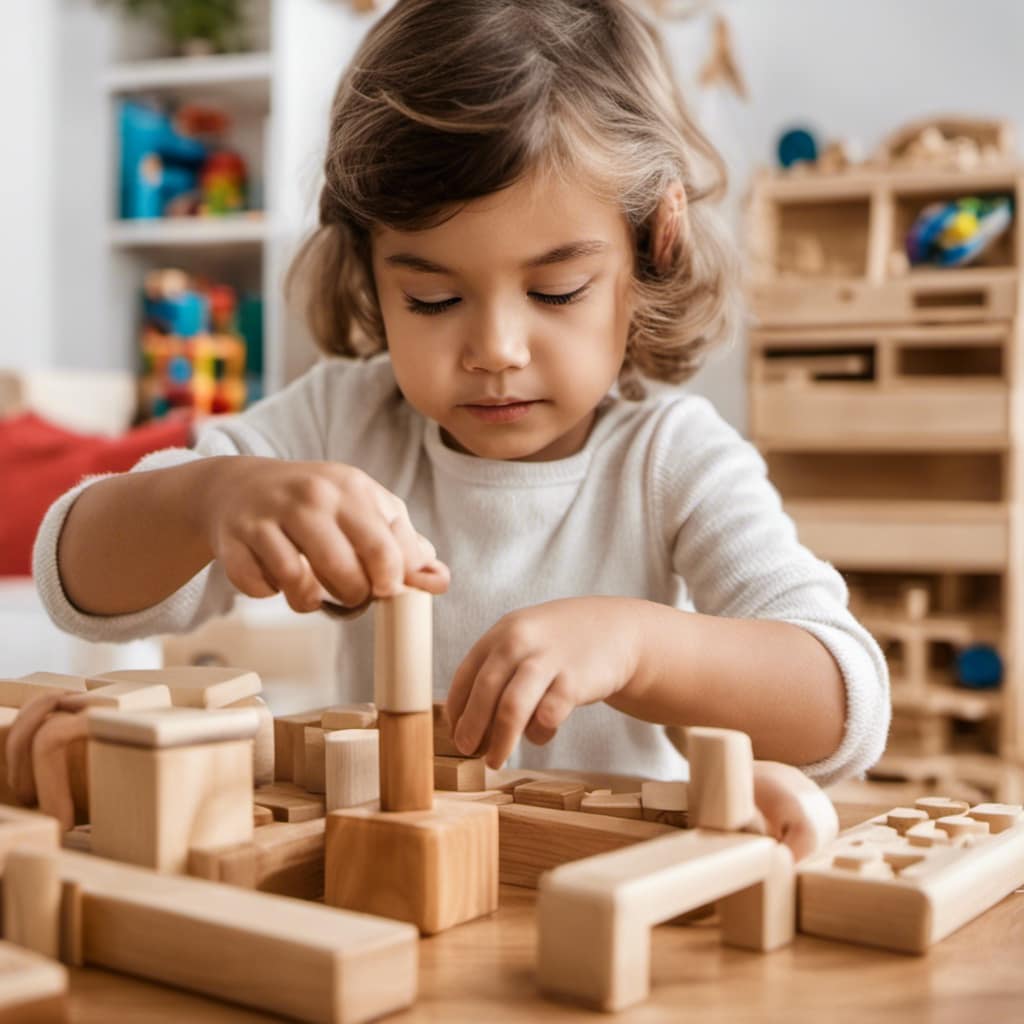
In the next section, we’ll discuss the importance of seeking toys that encourage social interaction.
Seek Toys That Encourage Social Interaction
When selecting Montessori toys, it’s important to prioritize those that encourage social interaction.
Interactive play not only promotes communication and collaboration, but also helps children develop important social skills.
Toys that promote group activities, such as board games or building sets, provide opportunities for children to engage with others, learn to take turns, and practice problem-solving together.
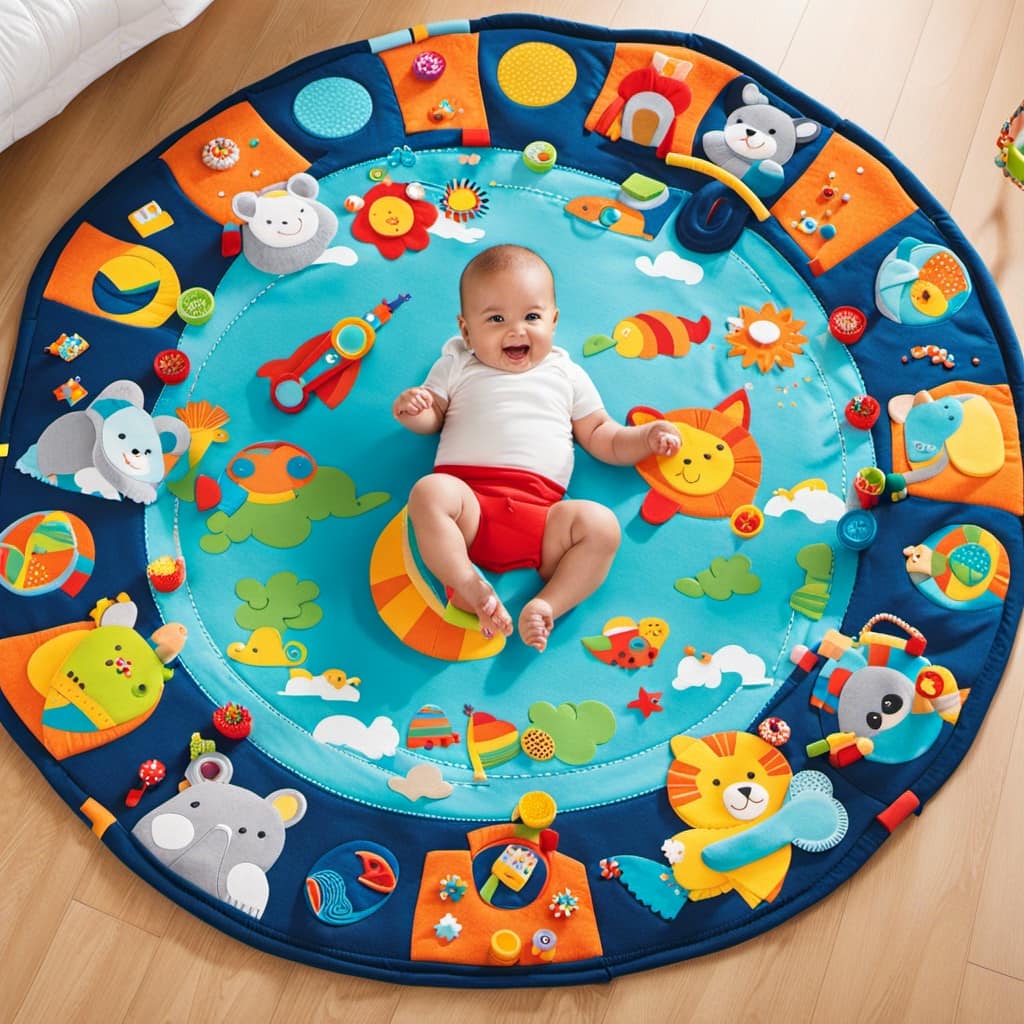
Importance of Socializing
Encouraging social interaction through the selection of toys is crucial for fostering the development of important interpersonal skills in children. When children engage in social play, they not only learn to communicate and collaborate effectively, but they also develop empathy, problem-solving abilities, and emotional intelligence. The benefits of socializing extend beyond childhood, as these skills are essential for building healthy relationships and navigating the complexities of the adult world.
To encourage social interaction, consider selecting toys that:
- Promote cooperative play: Toys that require teamwork and shared decision-making, such as board games or building sets, encourage children to work together towards a common goal.
- Encourage role-playing: Toys like dress-up costumes or pretend play sets provide opportunities for children to take on different roles and engage in imaginative play, fostering creativity and social understanding.
By prioritizing toys that promote social interaction, parents and caregivers can help children develop the necessary skills to thrive in social settings and enjoy fulfilling relationships.
Now, let’s explore the benefits of interactive play.
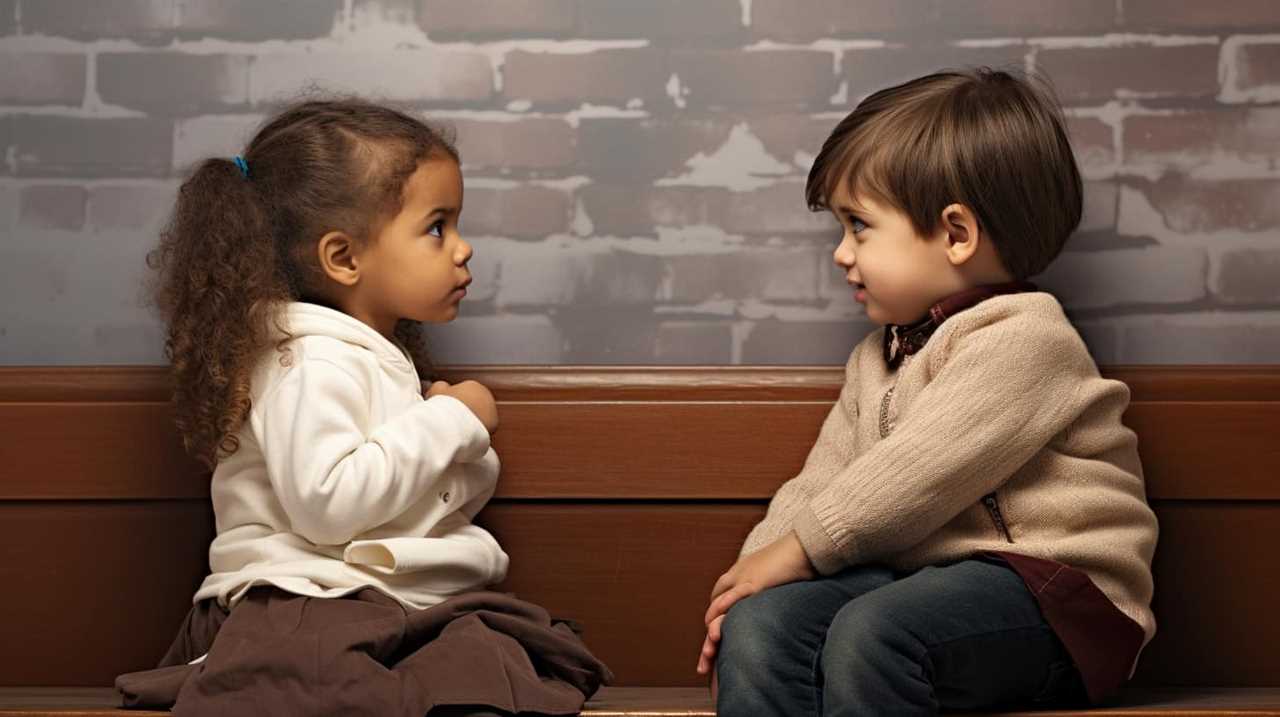
Benefits of Interactive Play
Through interactive play, we can foster the development of important interpersonal skills in children, such as communication, collaboration, empathy, problem-solving, and emotional intelligence.
Interactive play benefits children by providing them with opportunities to engage with others, learn from their peers, and develop crucial social skills. By participating in activities that require social interaction, children learn how to communicate their thoughts and feelings effectively, negotiate and resolve conflicts, and work together towards a common goal.
They also develop empathy and understanding as they learn to consider others’ perspectives and feelings. Additionally, interactive play helps children develop problem-solving skills as they navigate through challenges and find creative solutions.
Toys for Group Activities
We should look for toys that promote social interaction and encourage collaboration among children. When it comes to group activities, there are certain toys that can enhance group dynamics and foster cooperative play. Here are some suggestions:

-
Board Games: Games like Snakes and Ladders or Monopoly promote interaction, communication, and teamwork as children strategize and play together.
-
Building Blocks: Construction sets allow children to work together, share ideas, and collaborate to build structures, developing their problem-solving and teamwork skills.
Encouraging social interaction through group activities is essential for children’s development. By engaging in cooperative play, children learn how to communicate effectively, take turns, negotiate, and work together towards a common goal. These skills are crucial for their future success in relationships, school, and work.
Frequently Asked Questions
How Can I Ensure That the Montessori Toys I Select Are Age-Appropriate for My Child?
We can ensure the age appropriateness of Montessori toys by considering our child’s developmental stage and abilities. Select toys that challenge and engage them, while also promoting their physical, cognitive, and emotional growth.

Are There Any Specific Types of Materials That I Should Look for in Montessori Toys to Promote Sensory Experiences?
To promote sensory development, look for Montessori toys with a variety of textures, colors, and shapes. Open-ended play is important for encouraging creativity and problem-solving skills.
Can You Provide Examples of Practical Life Activities That Can Be Incorporated Into Montessori Toys?
Examples of practical life activities in Montessori toys include pouring and transferring activities, buttoning and tying activities, and sorting and matching activities. These activities help develop fine motor skills and promote independence and concentration in children.
How Can I Determine if a Toy Is Made From Natural and Eco-Friendly Materials?
When determining eco-friendly materials for Montessori toys, we carefully choose non-toxic options. Ensuring the safety of children is our priority. By researching and reading labels, we can select toys made from natural and sustainable materials.
Are There Any Specific Types of Montessori Toys That Are Known to Promote Problem-Solving Skills?
Montessori toys that enhance problem-solving skills are crucial for cognitive development. Open-ended toys provide the opportunity for children to think creatively and find solutions. Our expertise allows us to guide you in selecting the perfect toys.

Conclusion
In conclusion, choosing the perfect Montessori toys can greatly benefit a child’s development.
By selecting age-appropriate toys that offer open-ended play options and focus on sensory experiences, children can engage in hands-on learning and enhance their concentration skills.
Additionally, opting for multi-purpose toys that promote problem-solving and encourage social interaction can further enrich their playtime.
So, let’s embark on this exciting journey of selecting the best Montessori toys and watch our little ones thrive and flourish!
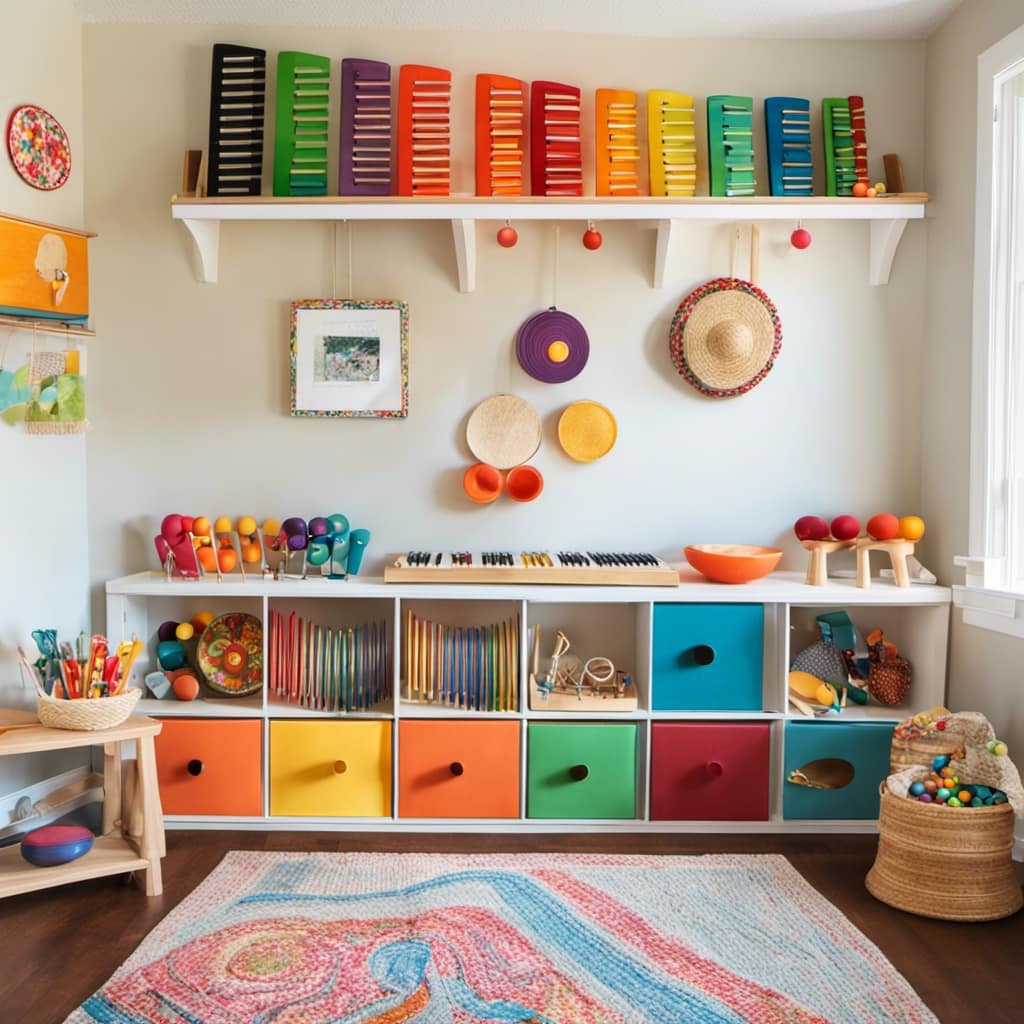
It’s like discovering a treasure trove of endless possibilities for their growth and happiness.





